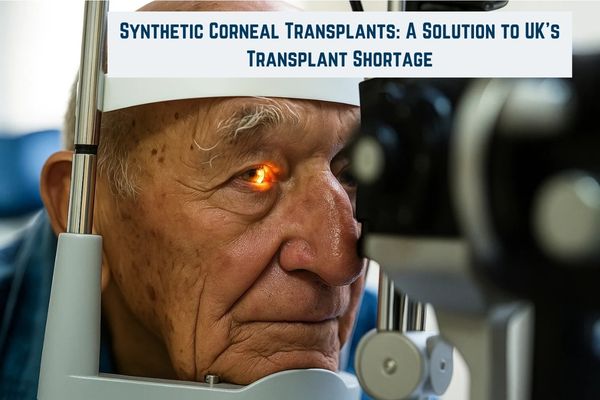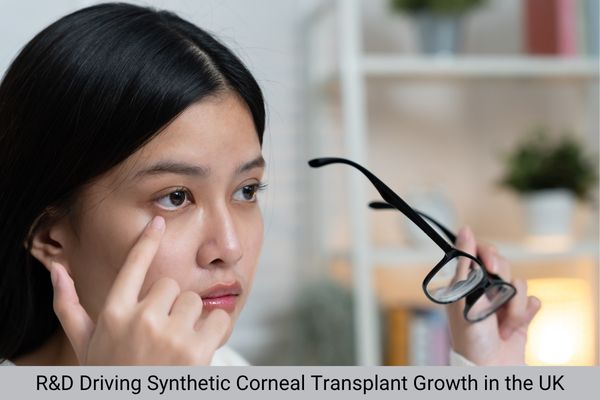Objective
The primary objective of this article is to explore how the UK healthcare system is adapting to the increasing demand for synthetic corneal transplants. As this advanced procedure becomes more widely available, it is crucial to understand the system’s response to ensure that cities such as Brighton, Sutton and Haywards Heath can effectively accommodate this shift. By examining regional healthcare providers and how they are integrating these innovative transplants into their practices, the article will highlight the challenges and strategies used to incorporate synthetic corneal transplants into mainstream ophthalmology care across the UK.
Introduction:
The rise of synthetic corneal transplants marks a significant advancement in the field of ophthalmology. This procedure offers an alternative to traditional corneal transplants, which typically rely on human donor tissues. As synthetic corneal transplant technology continues to evolve, the UK healthcare system is actively adapting to accommodate this innovative treatment. The growing demand for artificial corneal transplants, particularly in cities like Brighton, Sutton and Haywards Heath, is prompting changes in how healthcare providers approach these procedures. In this article, we will explore how the UK healthcare system is responding to this shift and what it means for patients seeking treatment in various regions.
Why is the Rise of Synthetic Corneal Transplants Important in the UK?

The need for corneal transplants is becoming increasingly urgent in the UK, as a number of factors are contributing to a higher demand for these procedures. Traditional corneal transplants face several challenges, including a shortage of donor tissues, long waiting lists and complications arising from tissue rejection. Synthetic corneal transplants offer a potential solution to these issues by providing an alternative that is not dependent on donor availability.
Synthetic corneal implants, are engineered materials designed to replace the damaged cornea. These materials are increasingly made from advanced biocompatible polymers or synthetic hydrogels, which replicate the structure and function of natural corneal tissue. In response to the growing demand for these transplants, healthcare systems across the UK, particularly in major cities like Brighton, Sutton and Haywards Heath, are evolving to accommodate these technologies.
The UK healthcare system’s ability to adapt to the rise of synthetic corneal transplants can enhance the accessibility and efficiency of eye care services. As more patients opt for artificial corneal implants, NHS hospitals, clinics and private healthcare providers must ensure they are prepared to meet the needs of those seeking these innovative treatments.
How Are Healthcare Providers in Brighton Adapting to Synthetic Corneal Transplants?
Brighton, with its rich medical infrastructure and close proximity to London, has been an early adopter of synthetic corneal transplants. The city is home to several leading eye care centers that are actively integrating this advanced technology into their practices. These facilities are working closely with specialists to ensure that patients in Brighton have access to the latest treatments for corneal disease.
The local NHS services in Brighton are expanding their capacity to perform artificial corneal transplants, thanks to investments in state-of-the-art medical equipment and training programs for surgeons. Additionally, clinics in Brighton are collaborating with researchers to ensure that artificial corneal transplant techniques are both effective and safe. In this way, the healthcare system in Brighton is evolving to meet the needs of patients who may no longer have access to suitable donor tissue or are seeking alternative treatment options.
Testimonials
“Extremely gentle, professional and informative, Could not wish for more“
What Is the Role of the NHS in Sutton in Facilitating Synthetic Corneal Transplants?
In Sutton, a city known for its strong healthcare services, the NHS is at the forefront of integrating synthetic corneal transplants into mainstream medical practice. The NHS hospitals in Sutton are increasingly becoming centers of excellence for artificial corneal transplants, with specialists dedicating their efforts to improving patient outcomes.
The role of the NHS in Sutton involves not only providing the surgical expertise required for synthetic corneal transplants but also ensuring that patients have access to the post-operative care necessary for recovery. With synthetic corneal implants, patients may require longer follow-up times to monitor the success of the transplant and Sutton’s healthcare providers are investing in specialized clinics for post-transplant care.
As the demand for artificial corneal transplants in Sutton increases, healthcare providers are focused on making the procedure more accessible, which may involve collaborating with national and international experts to improve both the quality of care and patient outcomes.
How Are Haywards Heath's Healthcare Systems Meeting the Rise of Synthetic Corneal Transplants?
Haywards Heath, a town in West Sussex, has become a notable area for the development of synthetic corneal transplants. Although smaller in comparison to cities like Brighton or Sutton, Haywards Heath’s healthcare providers are innovating to accommodate the increasing need for artificial corneal transplants.
In Haywards Heath, healthcare professionals are working alongside national networks to incorporate Synthetic Corneal Implant technologies into local services. The Royal Sussex County Hospital, located just a short distance from Haywards Heath, is leading research into synthetic corneal implants. As the demand for these transplants rises, Haywards Heath’s healthcare system is adapting by fostering collaboration between hospitals, researchers and healthcare providers.
Moreover, private clinics in Haywards Heath are expanding their offerings to include synthetic corneal transplants, allowing for more choice and accessibility. This is important for patients who may not have access to NHS services but wish to benefit from these advanced treatments.
What Challenges is the UK Healthcare System Facing in Adapting to Synthetic Corneal Transplants?
Despite the advancements made in synthetic corneal transplant technology, the UK healthcare system faces several challenges in fully integrating these procedures across the country. One of the main issues is the initial cost of these synthetic implants, which can be higher than traditional donor corneas. While these costs may eventually decrease over time as the technology becomes more widespread, the current expense can be a barrier to rapid adoption.
Additionally, the training and expertise required for surgeons to perform synthetic corneal transplants is a significant challenge. While many eye care professionals in the UK are skilled in traditional corneal transplant surgeries, they may need additional training to handle the complexities of synthetic implants.
Furthermore, the healthcare system’s ability to meet the growing demand for artificial corneal surgery in cities like Brighton, Sutton and Haywards Heath requires careful planning. Regional disparities in healthcare access may result in some areas experiencing longer wait times for these procedures, while others may face logistical challenges in managing the influx of patients seeking treatment.
Client Speaks
“I am confident about this doctor“
How Can Research and Development Support the Rise of Synthetic Corneal Transplants in the UK?

Research and development play a critical role in advanced synthetic corneal transplant technology. In the UK, both academic institutions and healthcare providers are investing in research to improve the quality and longevity of synthetic corneal implants. The ongoing development of new biomaterials and innovative surgical techniques can help ensure that artificial corneal transplants remain a viable option for patients across the UK.
One example of this can be the collaboration between researchers in Brighton and leading eye care institutions in London. This collaboration is focused on improving the materials used in synthetic corneal surgery to better match the structural properties of natural corneal tissue. In addition to improving the performance of synthetic corneal implants, this research could lead to more affordable and accessible treatment options for patients in cities like Sutton and Haywards Heath.
What Does the Future Hold for Synthetic Corneal Transplants in the UK?
As synthetic corneal transplant technology continues to improve, it is likely that the UK healthcare system will become even more accommodating of these procedures. The expansion of services in cities like Brighton, Sutton and Haywards Heath demonstrates the growing acceptance of synthetic corneal implants as a valuable treatment option.
With further advancements in research, better training for healthcare professionals and increased accessibility to synthetic corneal transplants, the future looks promising for patients in the UK. It is expected that these procedures will become more widely available, offering new hope for those with corneal disease who may not otherwise have access to a suitable donor cornea.
Conclusion
The rise of synthetic corneal transplants represents a transformative shift in how the UK healthcare system is addressing the needs of patients with corneal diseases. As cities like Brighton, Sutton and Haywards Heath continue to adapt to this emerging technology, the healthcare system is working hard to integrate these advancements into everyday practice. While challenges remain, the future of synthetic corneal transplants in the UK is bright, offering new hope to thousands of patients in need of corneal care.
Author Bio:
Sussex Eye Laser Clinic, led by Consultant Ophthalmic Surgeon Mr. Mayank A. Nanavaty, offers advanced eye care solutions tailored to individual vision needs. With deep expertise in cornea- and lens-based refractive procedures, Mr. Nanavaty provides personalised vision correction solutions including implantable lenses, ipl for dry eyes and laser surgery. Each patient undergoes a comprehensive eye assessment to ensure treatments align with their visual goals. Using cutting-edge technology and a patient-focused approach, the clinic continues to lead in delivering high-quality refractive care.
